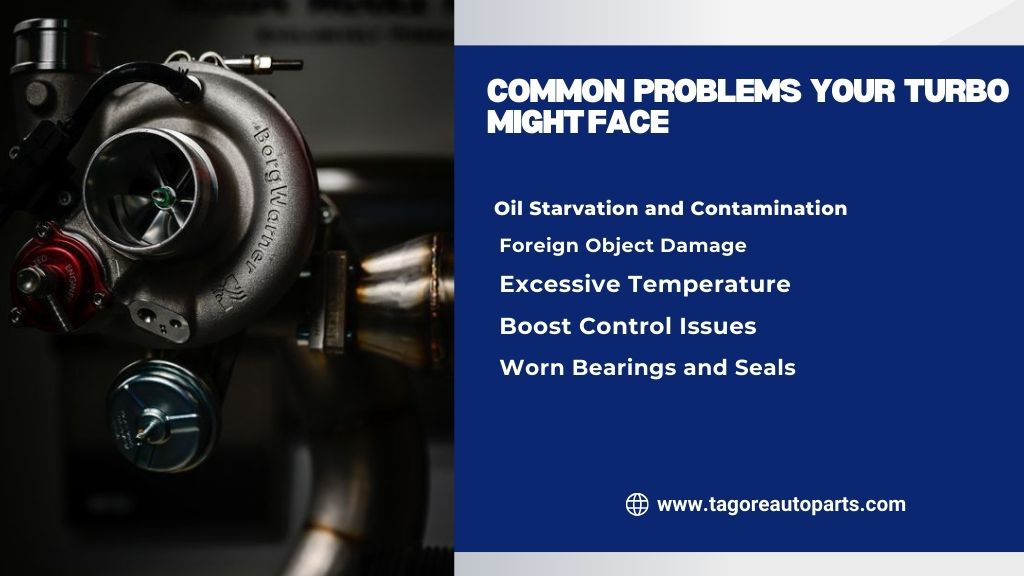
Common Problems Your Used Car Turbo Might Face
Some modern diesel engines can produce high temperatures, so the oil may crack and break down. The hydrocarbons in the oil mix with oxygen, producing organic acids that can be highly corrosive. This leads to oxidation in the turbocharger.If the acids become concentrated, they might attack the bearings and cause failure in the turbocharger. If the oil in the turbo forms a sludge, it may go directly into the filters, damaging the oil supply of the whole engine. Furthermore, if the oxidation becomes very severe in the engine, you might be able to see hard varnish. The sludge may pass through the bearing housing, sticking to the internal surface and preventing the oil from flowing freely.The problem with the oil flow may also lead to oil starvation and leaking pipes. Oil may also accumulate on the turbine side of the engine. Therefore, the heat will cause it to harden, leading to a dysfunctional turbocharging system.
Contamination
Most turbocharger problems are related to oil changes and breakdowns caused due to air and heat exposure. However, other elements can also cause oil contamination. For example, foreign matter may enter the engine through the air system, damaging the cylinders and the turbocharger’s efficiency.Some fuel combustion elements, including ash, soot, unburnt fuel-heavy ends, and water, may enter the turbocharger and contaminate it. Thus, the engine undergoes an oil breakdown due to the metal materials passing through the turbocharger.
Air leaks in the turbocharger system are frequently the cause of the whistling or whining sounds. These unique sounds can be produced by air escaping from a system breach.
Weird Noises
Have you heard odd sounds emerging from your engine, such as high-pitched screaming or whistling and whining? Strange noises can frequently indicate issues with a turbocharger. These sounds could be a sign of issues with the bearings or other internal parts of the turbocharger.
Air leaks in the turbocharger system are frequently the cause of the whistling or whining sounds. These unique sounds can be produced by air escaping from a system breach.. On the other hand, a high-pitched scream may be a sign of a damaged turbine or compressor wheel, which can occur due to excessive wear or foreign object ingestion.Bad oil seals. If you look at the turbine wheel and it appears WET, the turbine shaft seal is bad. It is more common that the turbine shaft seal will leak before the compressor seal because of the extreme temperatures the turbine seal sees. The most common killer of oil seals is excessive shaft play.
Damage to the turbine or compressor wheelr
It is more common for there to be damage to the inducer of each turbine than the exducer, so be sure to examine both wheels very well. Remember- the inducer of the turbine wheel is only visible by peering into the turbine housing inlet (the flange that mounts to the manifold.)
Exhaust housing cracks.
Most cracks appear on the interior of the exhaust housing. Usually, these cracks are from the rapid heating and cooling that the housing sees, and they generally will not effect performance of the turbo. However, if cracks are present, be sure they aren't the whole way through where the housing will leak or cause the wastegate flapper to not seal properly.
Hot Stopping
Another common turbo problem is hot stopping. While mainly an issue for performance cars due to their short, intense accelerations, hot stopping (or hot stops), refers to the motion in which the turbo cannot dissipate excessive heat from constantly shutting off the engine. Normally, turbochargers force air into the engine to keep it cool throughout the drive. If the turbo is at its peak performance and you shut off the engine, it works harder than it’s designed for. The main shaft can bend and misalign over time. Extra strain can cause wear on its internal components. Naturally, this can cause the turbo to fail and require repairs. Avoid this with slower, gentler driving (or idle for a couple of minutes) so that the engine (Turbo) remains cool.
Contact Us
We offer reliable shipping services and put the needs of those they serve first. Customers can reach them at +1 888-558-6437 or through www.tagoreautoparts.com with any questions.Tagore Auto Parts is committed to offering outstanding customer service and used turbocharger. Have a query or need help? Contact us
Address: 2700 Patriot Blvd., Glenview, IL 60026, USA
Phone: +1 888-558-6437
Email: support@tagoreautoparts.com
Website: www.tagoreautoparts.com

